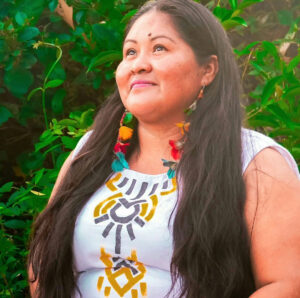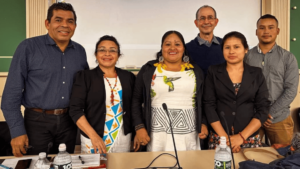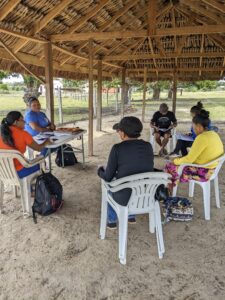News & Blogs
Network Member Interview: Immaculata Casimero, Wapichan Wiizi Women’s Movement
Immaculata Casimero is a Wapichan woman and is the co-founder of Wapichan Wiizi Women’s Movement. She also works as a Communications Officer at the South Rupununi District Council. Immaculata shares her learning journey and what inspires her, along with the important work Wapichan Wiizi Women’s Movement in Guyana does in the field of land and environmental justice.
Please introduce yourself, your organization, and what your organization does.

Immaculata Casimero
My name is Immaculata Casimero, a Wapichan woman from Guyana.
I live in Aishalton Village, in the Wapichan Territory. I work as the Communications Officer in the South Rupununi District Council (SRDC), which I would say is the traditional organization within the Wapichan Territory.
We work on land rights and other, I would say, issues that affect Indigenous Peoples. And one of the things that we have been doing for some time now is to have the Wapichan Territory legally recognized by the Government of Guyana. We have been advocating for this for over decades now. SRDC also works on wildlife management, women, youth. We also do territorial monitoring, specifically at the border between Guyana and Brazil. SRDC’s work is very big, I would say, within the territory.
In 2021, you took part in the Legal Empowerment Leadership course. Can you talk a little bit about what you learned there? How did this course lead you to work on carbon markets now?
That course was immediately after the pandemic. I signed up to do the Legal Empowerment Course, along with another member from the SRDC.
Even though I have been doing work on national and international laws, listening to the different stories was powerful. I think there was one that was shared particularly about where a cement factory was being established, and that was affecting people. The case showed how they used the law to take the company to court. And they won that case. That company affected people’s health. Once you know the law, you’re able to use it. That was something that I have learned from there, because if you don’t know the law, how can you exercise your rights based on those?
“It was very informative for me as an Indigenous Person to listen to others who experience similar situations, and listen to stories on how they have used the law to seek justice.”
So that is something I think I have taken away from that Legal Empowerment Course that we did. And I think I shared the work that we have been doing, especially as it relates to monitoring our environment in South Rupununi, and how these reports are developed from the data that is gathered and then submitted to the government, so that they can address the issues that affect us as Indigenous Peoples within our territory.
Can you also talk a little bit about how you’ve become an expert in carbon markets and what spurred that?
I first heard the word ‘paralegal’ before, but after attending the Legal Empowerment Course, that is when I really understood what it means. Being a paralegal is how you use the law, even if you’re not a lawyer, but you’re learning some of the laws that you can then use within the community. Where we come from, we do not have lawyers in our community. They’re only accessible in the coastal areas, which is the capital city of Guyana.
And, you know, oftentimes there’s so many policies, legislation that is being developed without the people’s input without Indigenous Peoples’ input. So then, when I was attending the Legal Empowerment Course, we had an assignment to do, which is to come up with what you want to do after you complete the program. So what I did was I developed my own work plan, and I said that I wanted to have paralegals within the Wapichan Territory. But the focus was more to have women as paralegals, to help with the different social issues that communities face, such as like domestic violence, rape sexual violence, and so on. So I developed that work plan, and I think I shared it with some of the technical people who support us in the work that we do.
“I had this dream of having paralegals in the Wapichan Territory, and I wanted most of them to be women. Over the years, the organization then came up to have a paralegal team trained, and now we have a paralegal program which was established in November 2022.”
Immediately after I returned from COP 27, I came into that training dealing with the Amerindian Act, which is the legislation that speaks about us as Indigenous Peoples. So we had ten people trained then. I think we still have ten people. All ten of us went to have this training on carbon markets.
From COP 27, I think I’ve been reading a lot about carbon markets and carbon credits, not feeling too happy when I heard that nature is going to be monetized. I was not happy at that time, but then, there are some things that we cannot really stop. The world is moving and changing, so we all have to see how we can learn more about what is happening at the global level, which can have an impact on our lives as Indigenous Peoples. That’s how I came to really learn about carbon markets. With our paralegals, it was six days of intense training, where we looked at the different laws that protect Indigenous People’s rights in Guyana, including national and international laws. We’ve looked at carbon markets, and looked at other Indigenous Peoples’ experiences in other countries, like Peru, and the United States of America. And we looked at different lessons that other Indigenous Peoples like ourselves have learned from these markets. And that’s how we got involved in knowing what carbon markets are.

Immaculata Casimero (center) and her delegation from Guyana in New York during the 2023 Climate Week.
And then we went out to work in the field, because now that we’ve learned something, we can go back and teach our people or educate them on this. Because all we know as Indigenous Peoples is that you’re receiving money from carbon money. And that’s all we know. I mean, we do not know what will happen to us, and how our livelihoods and lifestyles will be affected when you have these different policies being developed. Maybe our forests will be monitored, and we will be stopped from doing our traditional activities, and of course we still need to have our land legally recognized. So looking at all these different issues, we went out to the communities and trained them. We work in three teams; three persons in each team. We do the trainings in our own language. We try to break down technical words so people can understand. It’s like providing them with information that is much needed.
What experience or individual inspired you to join the fight for land and environmental justice?
First, I would say my dad. He’s the founder of an organization in Guyana, which is called the Amerindian People’s Association. I think I was eight years old when he started attending different meetings. That’s when the organization was being formed, and we now had representation for Indigenous Peoples. A lot of people were afraid to speak out on certain topics – they are still afraid up to today. My dad and a priest named Father De Souza used to talk and hold many meetings at that time. We need to talk about land rights, and we need to let people know how important human rights and land rights are. After church, they would hold meetings and talk about land rights. They would recall some of the things our ancestors said. For example, ‘people will come to take your land one day, and you need to be strong to protect it’.

Visiting communities and local partners.
And so, as a child, that is something that I knew of ever since. One time they had this meeting, and my dad was speaking in the local language and speaking about land rights. Immediately after, he was arrested. He was taken to the police station along with the priest, and they were questioned on what he was doing. Apparently, word went to higher authorities to say that he wanted to start a rebellion against the then-government.
My dad explained that it was just a meeting that we’re holding, that we were just talking about our lands and how important this is to us. He was not locked up; he was just taken to the station. That was the first time I knew a bit about Indigenous People’s land rights.
I attended school in Georgetown – the capital city. Growing up and coming back home, I worked with the communities. I was elected to be a community leader – a village councilor– in 2015. I worked as a councilor for three years and started to attend District Council meetings. Since I was a leader, I was invited and once you’re invited, you have to attend the meetings. Again, I learned about the land struggle of my people, and the different concerns that they had. There is one person who we call ‘Chief’; his name is Mr. Tony James. He is no longer a Chief, but we still call him that. I found myself listening to Chief during these meetings – he was brave, very fearless, I would say I would always sit and listen to him. He would share stories. It’s like he was mentoring me. Even though we still struggle to have legal recognition, he was very clear in saying that ‘I’m going to die, I need someone to replace me. If I’m not here, who will stand to represent us as Wapichan people? ’ I think that made me do the work that I’m doing right now. As I am older now, I realized how important it is.
Was there a turning point or particular moment in your life that shaped you or had a lasting impact on your journey?
I would say returning to the community and being elected as a leader was a turning point. I was a bit disconnected, because I was out in the township of Lethem and life was tough and different there. You learn about the struggles, then you go into communities, and you’re hearing their concerns. I think that was the point where I decided that I’m going to do this work, and that this is something that I should be involved in.
This work can be challenging and difficult. What inspires you and helps you keep going?
Some days would be overwhelming, and some days I feel like giving up. I feel like I’m saying one thing over and over again. I’m trying my best. Sometimes I think that I should just go sit at the ranch and mind the chickens and pigs, and forget about everyone and everything that’s happening in my village, in my country, and in the world, and just stop fighting against the powerful corporate world and all that.
“I feel like sometimes, we as humans, we’re asleep or so unconscious of what happens around us. If we can just be awakened from this unconsciousness, and try to help, or even just see if we can do one thing so we can make our contribution to make our communities and even our country a better place.”
When you go into communities, you meet different people and when they say ‘I need help with this’, or when someone calls and says, ‘We have a problem we need to address and I need you to call the hospital’, or if someone is bitten by a snake, or if there’s a domestic violence case, and all of these things – people come to you because they feel that you can actually help them or find a solution to their problem. Not every problem, of course, but they have that confidence in you to do something. So, sometimes they’re the ones who keep me going. They look up to me, so I need to do this work, and I need to be of service to my people. That’s what keeps me going.
I think this calls for an awakening of humanity to really look around us and see what’s happening. Once you’re conscious of that, then you can make changes in whichever place or space you are in.
SHARE THIS:
